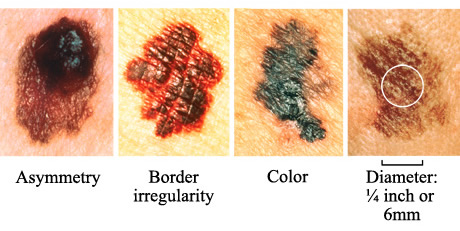General Dermatology
Skin Cancer
Skin cancer is the most prevalent of all types of cancer. It is estimated that more than one million Americans develop skin cancer every year. Fair-skinned people who sunburn easily are at a particularly high risk for developing skin cancer.
The most common types of skin cancer include basal cell carcinoma (BCC), squamous cell carcinoma (SCC), and malignant melanoma (MM). Even more common than these cancers is actinic keratoses (AK), which usually presents as multiple rough scaly skin lesions and are considered pre-malignant growths appearing on sun exposed skin areas. These lesions have the potential to progress to squamous cell carcinoma.
Basal Cell Carcinoma (BCC) is the most common type of skin cancer, but also the least aggressive with very little potential to spread to other areas of the body. However, if left untreated, they may enlarge, ulcerate, bleed and destroy local tissue in the area. They appear as shiny bumps or scaly, red patches predominantly in area of the body that has received significant sun exposure.
Squamous Cell Carcinoma (SCC) is the second most common type of skin cancer. These grow more rapidly than basal cell carcinoma and have potential to metastasize (spread to other areas of the body). They appear more commonly on sun exposed sites as tender red enlarging lumps.
Malignant Melanoma is the most deadly of all skin cancers. The incidence of this cancer is increasing, and every year, over 8,000 Americans will die from melanoma. The death rate has been kept in check because melanoma is usually curable when detected in its early stages and patients are seeking help sooner. Melanoma may appear suddenly or begin in or near a mole. Melanomas often appear as pigmented lesions that are asymmetrical with irregular borders, variegated color, and larger than 6 mm in diameter. Other warning signs include:
- Changes in the surface of a mole.
- Scaliness, oozing, bleeding, or appearance of a new bump in a mole.
- Spread of pigment from the border of a mole into the surrounding skin.
- Change in sensation including itchiness, tenderness, or pain in a mole.

Treatment of Skin Cancer
If the dermatologist is suspicious of a skin cancer, usually a biopsy of the lesion will be performed. If a skin biopsy reveals cancer, the dermatologist has an array of medical and surgical procedures as treatment, depending on the type of cancer, the size and location, and the needs of the individual. Actinic keratoses are usually treated by freezing them with liquid nitrogen, topical creams, or photodynamic therapy (PDT). It is most important to remember that early detection is the surest way to a cure.
Warts
 Warts are non-cancerous skin growths caused by a viral infection in the top layer of the skin. Viruses that cause warts are called human papilloma virus (HPV). Warts are usually skin colored and feel rough to the touch, but they can be dark, flat, and smooth. The appearance of the wart depends on where it is growing and the sub-type of HPV.
Warts are non-cancerous skin growths caused by a viral infection in the top layer of the skin. Viruses that cause warts are called human papilloma virus (HPV). Warts are usually skin colored and feel rough to the touch, but they can be dark, flat, and smooth. The appearance of the wart depends on where it is growing and the sub-type of HPV.
There are several different kind of warts including:
- Common warts
- Foot (Plantar) warts
- Flat warts
- Genital warts
All these types of warts are passed form person to person, sometimes indirectly. The time from the first contact to the time the warts have grown large enough to be seen is often several months. Some people get warts depending on how often they are exposed to the virus. Wart viruses more easily take hold in skin that has been damaged or injured to some degree. Some people are more resistant to getting warts because of their innate immunity to the virus.
Treatment of Warts
There are a variety of methods dermatologists use to treat warts depending on the type of warts or there location on the body. These methods include freezing with liquid nitrogen, destruction with laser or electrosurgery, application of certain chemicals or immunotherapy. Your dermatologist will usually discuss the options in each individual case before embarking on a specific treatment.
![]() To learn more about our General Dermatology services or to schedule an appointment, please contact our office.
To learn more about our General Dermatology services or to schedule an appointment, please contact our office.
